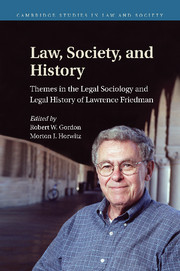Book contents
- Frontmatter
- Contents
- Contributors
- Introduction
- PART I OVERVIEWS AND ASSESSMENTS OF FRIEDMAN'S WORK
- PART II APPLICATIONS OF CONCEPTS, INSIGHTS, AND METHODS IN FRIEDMAN'S WORK
- PART III THE LEGAL PROFESSION
- PART IV LAW AND LARGE AREAS OF SOCIAL LIFE
- Law and Contractual Relations
- Law and the Environment
- Law and Religion
- 14 Separating Church and State
- Law and the Family
- PART V FACTS FROM THE UNDERGROUND: DIGGING LEGAL HISTORY OUT OF THE CELLAR
- PART VI PERSPECTIVES FROM OTHER CONCEPTUAL WORLDS
- Index
- Titles in the series
- References
14 - Separating Church and State
The Atlantic Divide
Published online by Cambridge University Press: 07 October 2011
- Frontmatter
- Contents
- Contributors
- Introduction
- PART I OVERVIEWS AND ASSESSMENTS OF FRIEDMAN'S WORK
- PART II APPLICATIONS OF CONCEPTS, INSIGHTS, AND METHODS IN FRIEDMAN'S WORK
- PART III THE LEGAL PROFESSION
- PART IV LAW AND LARGE AREAS OF SOCIAL LIFE
- Law and Contractual Relations
- Law and the Environment
- Law and Religion
- 14 Separating Church and State
- Law and the Family
- PART V FACTS FROM THE UNDERGROUND: DIGGING LEGAL HISTORY OUT OF THE CELLAR
- PART VI PERSPECTIVES FROM OTHER CONCEPTUAL WORLDS
- Index
- Titles in the series
- References
Summary
TWO MODELS OF SEPARATION OF CHURCH AND STATE
If you go to the U.S. State Department Web site, you will find a 2004 posting entitled “Separation of Church and State in the U.S.” It includes the following proposition about comparative law: “The government of the United States – unlike Great Britain and other European countries – may not declare one religion as the national religion nor support one religion over another.” The implication is that the United States is unique among Western countries in its commitment to the separation of church and state. There is certainly some truth in this claim. American law is in fact unusually strict about maintaining an institutional separation of church and state. As a result, we Americans are not likely to embrace German or Scandinavian practices like paying pastors from state funds. Nor are we likely to permit the state to subsidize religious schools, as it does in France.
It is also true that our constitutional tradition of “free exercise” guarantees liberties that are not guaranteed elsewhere. This means that American law will never tolerate anything like the much denounced 2004 French headscarf law, which led the State Department to list France, along with numerous Third World dictatorships, as a country guilty of “abuses of religious freedom.” Nor has that particular “abuse,” if that is what it is, vanished since 2004. On the contrary, efforts to ban headscarves and burkas have been spreading across Western Europe for several years.
- Type
- Chapter
- Information
- Law, Society, and HistoryThemes in the Legal Sociology and Legal History of Lawrence M. Friedman, pp. 233 - 250Publisher: Cambridge University PressPrint publication year: 2011



